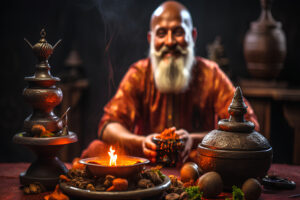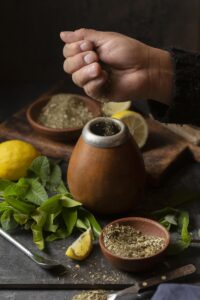
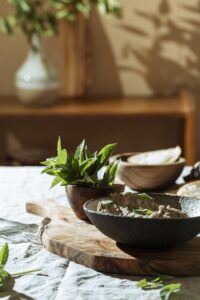
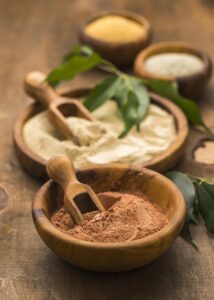
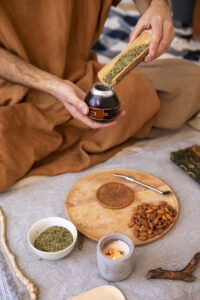

Ayurveda in Sri Lanka is a traditional system of medicine that has been practiced for thousands of years. It has a prominent place in the country’s rich cultural heritage. Ayurveda is deeply embedded in ancient Indian texts and offers a holistic approach to health and wellness. This ancient healing method encompasses an individual’s life’s physical, mental, and spiritual aspects.
History of Ayurveda in Sri Lanka
Centuries ago, a group of Indian physicians traveled to Sri Lanka, bringing with them the ancient practice of Ayurveda. This holistic system of medicine, which has its roots in Indian tradition, was introduced to the island nation and gradually began to influence the health and wellness practices of the Sri Lankan people. Over time, Ayurveda became deeply ingrained in Sri Lankan culture and the healthcare system.
The ancient Ayurvedic texts, such as Charaka Samhita and Sushruta Samhita, were translated into Sinhala, the native language of Sri Lanka. This translation aimed to make these valuable texts more understandable and accessible to the local population, thus spreading the knowledge and wisdom of Ayurveda among the people of Sri Lanka.
The Great King Buddhadasa
During the 4th century AD, when King Buddhadasa was in power, the country’s medical system underwent significant changes as Ayurvedic principles were integrated into it. The king took substantial measures to improve the healthcare system by establishing hospitals and appointing skilled physicians. These hospitals were explicitly designed to offer healthcare services rooted in the principles of Ayurveda, an ancient Indian system of medicine.
The king aimed to provide holistic and natural healthcare to his subjects by incorporating Ayurvedic practices. The appointed physicians were well-versed in Ayurvedic principles and were responsible for delivering personalized and effective treatments to patients. Overall, the king’s efforts in establishing these hospitals and appointing Ayurvedic physicians significantly contributed to the enhancement of healthcare services in his kingdom. This event marked a significant turning point in the progress and establishment of Ayurveda in Sri Lanka, signifying a substantial milestone in its development and institutionalization.
The connection with Sri Lanka’s natural resources
Ayurveda is deeply rooted in Sri Lanka’s natural resources and diverse ecosystems. The country’s lush green landscapes, abundant flora and fauna, and serene surroundings provide an ideal setting for this practice.
Ayurvedic practitioners, known as “Vedas,” use their extensive knowledge of medicinal plants, herbs, and minerals to promote a holistic approach to health and wellness. This approach emphasizes achieving a harmonious balance between the mind, body, and spirit and is a comprehensive and all-encompassing method to promote overall well-being.
Ayurveda in Sri Lanka acknowledges true well-being
This approach understands that our mental, physical, and spiritual dimensions are interconnected and essential for our well-being. It aims to promote overall wellness and enhance the quality of life by balancing all aspects of a person’s being. This approach acknowledges that each person is unique and tailors its strategies and interventions according to their needs and desires.
Instead of treating isolated symptoms or conditions, it seeks to uncover the root causes of imbalances and address them at their core. Considering the whole person, this approach provides a holistic solution for achieving true well-being.
Principles of Ayurveda
The prevention-based approach prioritizes taking proactive measures to address health concerns instead of only treating symptoms after they have occurred. According to this approach, every person has a unique constitution called a dosha that determines their physical, mental, and emotional characteristics.
The three doshas
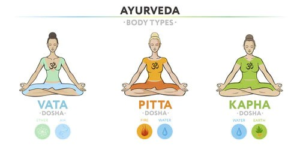
The three doshas, which are fundamental energies in Ayurveda, are Vata, Pitta, and Kapha.
Pitta dosha
The Pitta dosha, one of the three doshas in Ayurveda, is closely linked to the qualities of fire and heat. Responsible for carrying out various transformative processes in the body, Pitta operates in various parts of the body, including the gastrointestinal tract, liver, skin, eyes, and brain. Playing a crucial role, Pitta serves the following functions:
- Knowledge acquisition via understanding, as well as reasoning and judgment
- Fearlessness in the face of adversity
- From the first stages of food digestion to the latter stages of material change, metabolism occurs at every level.
- Thermogenesis keeps the core temperature where it should be.
- In order for us to see, our eyes translate what we see into signals that go down the optic nerve.
- Appetite is the sensation of wanting to eat or drink.
- The complexion of the skin influences its color and smoothness.
Kapha dosha
Kapha is the most weighty of the three doshas. It supplies the anatomical framework and the necessary lubrication for the organism. These properties serve to offset the mobility of Vata and the metabolic rate of Pitta. Kapha aids in the following functions:
- Mass and structure contribute to the voluminousness of biological tissues.
- Reproductive capacity and sexual potency to generate robust progeny
- Physical prowess
- Moisture and lubrication are necessary to avoid excessive friction between different bodily components.
- Stability provides the essential foundation for both mental and physical well-being.
Vata dosha
Out of the three doshas, Vata is the most crucial. Two arguments support this. The first thing that can happen is that if Vata is out of balance for a long time, it can make either Pitta or Kapha out of balance as well.
The most challenging kind of imbalance is a tridoshic imbalance, which occurs when Pitta and Kapha are both out of whack. In addition to the other two doshas, Vata is the primary force behind the functioning of the body, including all tissues and waste products. Vata performs the following functions:
- Various excretions, including those of the fetus, sperm, feces, urine, and sweat
- All of the body’s metabolisms, or Agni in Ayurveda, benefit from it.
- Connects all of the body’s sensory receptors to the central nervous system.
- Manages the myriad of bodily and mental motions, including processes like breathing, heart rate, drive, and muscular tension.
Ayurveda Department in Sri Lanka
Ayurveda is widely prevalent in the beautiful country of Sri Lanka. What distinguishes it from other forms of healthcare is its integration into the mainstream healthcare system. Ayurveda, an ancient Indian practice, has gained recognition and acceptance in Sri Lanka. As a result, Ayurvedic departments and units have been established within government hospitals to treat patients.
Integrating Ayurveda into the existing healthcare infrastructure has significantly increased its reach and enabled its holistic healing approach to positively impact a more significant population. By collaborating with modern medicine, Ayurveda has fostered a comprehensive and well-rounded approach to patient care. This integration has validated the effectiveness of Ayurveda and also ensures that individuals have access to a diverse range of treatment options that cater to their unique needs and preferences.
Popular Ayurvedic Treatments in Sri Lanka
Both residents and visitors looking for holistic healing experiences may find a broad choice of Ayurvedic therapies in Sri Lanka. Here are a few of the most common treatments:
1. Panchakarma
 Panchakarma is a popular cleansing treatment in Ayurveda, an ancient Indian medical tradition essential to Sri Lanka’s health culture. This method aims to remove toxic substances from the body and restore balance between the mind, body, and spirit. Panchakarma is known for rejuvenating the body and mind by promoting harmony and wellness.
Panchakarma is a popular cleansing treatment in Ayurveda, an ancient Indian medical tradition essential to Sri Lanka’s health culture. This method aims to remove toxic substances from the body and restore balance between the mind, body, and spirit. Panchakarma is known for rejuvenating the body and mind by promoting harmony and wellness.
This therapy is intriguing because it combines many treatments to improve health and restore balance to the body and mind. Professionals with extensive training and an intimate familiarity with the intricate system of muscles and pressure points in the body provide very relaxing massages as one of these remarkable procedures.
2. Shirodhara
Shirodhara is an Ayurvedic treatment that involves a trained therapist gently massaging a scented herbal oil into a 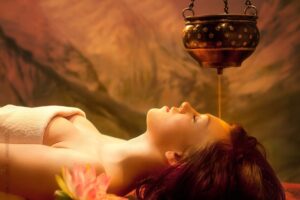 patient’s forehead in order to induce profound relaxation and rejuvenation. The oil is poured in a steady stream, cascading softly over the forehead, making for a calming and relaxing sensation.
patient’s forehead in order to induce profound relaxation and rejuvenation. The oil is poured in a steady stream, cascading softly over the forehead, making for a calming and relaxing sensation.
The heated oil and the therapeutic properties of the hand-picked herbs promote harmony and balance in the body and mind. Many advantages may be yours via this time-honored method that has its origins in the teachings of Ayurveda. It is often quite good for our health to partake in activities that help us relax, reduce tension, and sharpen our minds.
We give ourselves permission to rest and rejuvenate when we give our mental health the attention it deserves and actively seek out ways to relax and unwind.
 3. Herbal Bath
3. Herbal Bath
Herbal baths are like a spa day at home. Imagine soaking in a tub filled with warm water infused with fragrant herbs. It’s not just relaxing; different herbs bring therapeutic benefits. Lavender calms, eucalyptus invigorates. The scents envelop you, and your skin soaks up the herbal goodness, leaving you refreshed and revitalized. It’s not just a bath; it’s a sensory escape.
 4. Herbal medicine
4. Herbal medicine
Ayurvedic practitioners with extensive training and expertise have the extraordinary ability to diagnose and treat patients with individualized herbal formulas designed to address their particular symptoms and medical concerns. In order to determine which herbal medications are most effective, Ayurvedic practitioners take into account a patient’s dosha, or unique mind-body constitution, as well as their present health condition, lifestyle choices, and environmental circumstances.
Contact us for Ayurveda tours in Sri Lanka
Are you ready for a life-changing adventure that will take you on a journey through the ancient and healing traditions of Ayurveda in the stunningly beautiful country of Sri Lanka? Look no further! We are thrilled to offer you the chance to embark on this transformative experience with our Ayurveda tours.
Join us and discover a world of wellness, rejuvenation, and inner peace.


